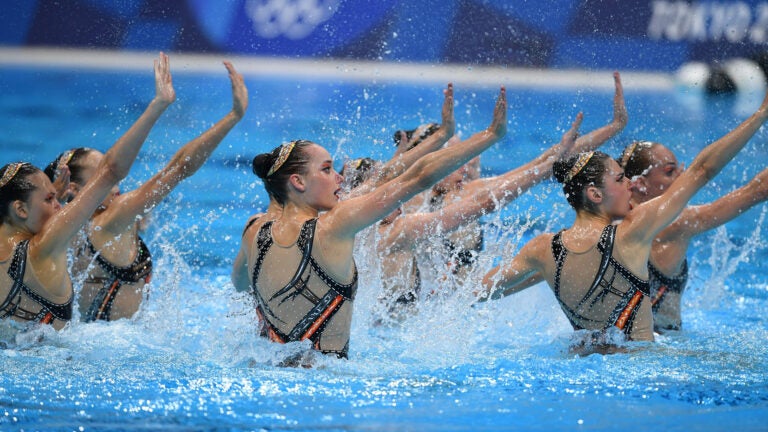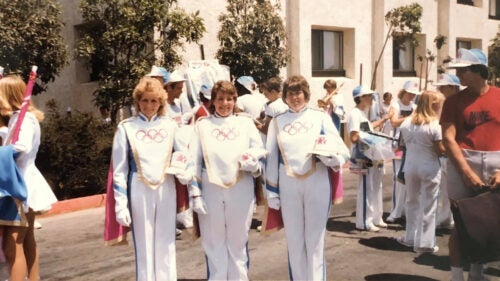
Olympic judge’s journey to the Paris Games includes a stop at USC Dornsife
For Cheryl Russell, the initial appeal came from the sport’s creative aspects. Since then, she’s come to appreciate how artistic swimming has grown and changed over the years, a fitting perspective from a former history major.
Russell, who earned her bachelor’s degree from the USC Dornsife College of Letters, Arts and Sciences in 1985, is one of five Olympic judges — more precisely, international technical officials — responsible for assessing each artistic swim team’s execution of elements in their routine. (Another panel rates their artistic impression.)
Artistic swimming judge’s full-circle Olympic moment

This isn’t Russell’s first time attending the Olympic Games. As a member of the USC Spirit of Troy marching band, she participated in the Olympic All-American Marching Band at the 1984 Los Angeles Summer Olympics. “There were a lot of USC members that were selected to be in that marching band, along with at least two members from every state in the country,” recalls Russell, who played tuba.
Comprising about 600 members in all, the band played at both the opening and closing ceremonies. “It was just fun to be surrounded by all those great athletes, all those great musicians,” she says.
Russell also volunteered as a helper for the synchronized swimming events, which held its Olympic premiere in USC’s pool that year. It would become the first point of what she terms a “full-circle moment.”
“I volunteered at synchronized swimming and saw those athletes and saw the judges,” she says, “and now I’m judging artistic swimming in Paris 40 years later.”
From “stunt” swimmer to international artistic swimming judge
Her path to Paris began when she was a child. “When I was a little girl, I went to summer camp and I learned some, I guess they’re called ‘stunts,’ and I came home very excited to tell my mom that I learned how to do a ‘turtle float,’” she recounts.
Her mother, a high school swim coach in Buffalo, New York, took Russell and her sister to join the Swimkins Synchronized Swimming Association, now the oldest continuous registered team in USA Artistic Swimming membership history.
Her family later moved to Southern California, where Russell began competing in artistic swimming, then dubbed “synchronized swimming,” when she was 11. She moved up to coaching at 16 and continued with several teams until she became a school teacher in Riverside, Calif., years later. (She retired from teaching in May 2023.)
“I was coaching in Riverside, and the head coach said, ‘We really need a judge. Why don’t you learn how to be a judge?’” says Russell.
After passing the required tests, she moved up the ranks as a local, regional, west zone and finally national judge. In 2006, she was invited, along with a colleague, to test to become an international judge.
Russell first declined but was persuaded to take the test as an “educational opportunity,” she says, smiling at what she soon found out was a ruse. “So we went out in the hallway and we took this test, and the next day they announced both of us as the newest international judges. … I’ve been internationally judging ever since.”
Trojan honored to be named an Olympic artistic swimming judge
Now the sole artistic swimming judge from the United States and judging at the Olympic games for the first time, Russell says she’s most impressed by how much the sport and the competitors have progressed.
“I mean, back in the day you would see Esther Williams movies, and they would be doing, you know, back strokes and making all these formations,” she says, referring to popular films of the 1940s and ’50s starring Williams, once a competitive swimmer. “Now it’s a really athletic sport that combines a lot of gymnastics into what they’re doing.”
When asked what she loves most about judging, though, she smiles. “What I like is there’s no coaching pressure — that’s good. And you get a front row seat to all the beautiful routines.”
But perhaps most of all, Russell is grateful for the opportunity. “I mean, I’m only one of 10 judges in the entire world selected to do this event, so it’s a huge honor.”
Follow along as Russell explains the difficulty of artistic swimming routines >>